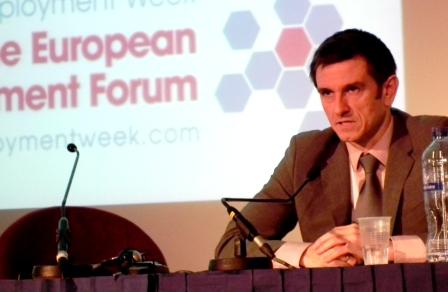An ageing Europe needs more skilled people in the health sector and the way we live needs to be greener.
The Commission has moved from “New skills for new jobs” to “New skills and new jobs”. The difference might seem slight, but there is an economic crisis in between, explained Giampaulo D’Angelo from the DG of Employment, Social Affairs and Equal Opportunities when addressing the Employment Week conference in Brussels on 24 November.
When the first agenda for new skills was presented in December 2008 it was still coloured by the more rosy future prospects of the preceding years. Today it is not only a question of acquiring new skills for new jobs. It’s just as much a question of acquiring new skills to keep current jobs.
Mismatch of skills
“Only 20 percent of the European workforce have jobs that fit their skills. The new skills issue is not new, but it has accelerated and become more accentuated by the crisis. Even though the European countries have lost millions of jobs there are at the same time millions of job vacancies that are not filled,” said Giampaulo D’Angelo.
An expert group who has studied the mismatch writes in their report that improving people’s skills is a real “win, win” for all – for the economy, for society, for employers and, of course, for individuals themselves.
In every single EU country, unemployment rates systematically vary with qualification levels.
The employment rate for those with high skills levels across the EU as a whole is approximately 85 percent, for medium skills levels 70 percent and for low skills levels it stands at 50 percent.
The EU Commission has a goal to move from 30-35 percent of the people with tertiary education, to 40 percent. But there are huge challenges. The average EU school dropout rate is 15 percent. The goal is to reduce that to 10 percent by 2020.
In the new agenda there are five main ways to get at better match between skills and what the employers demand.
- Develop better labour market intelligence. The ability to forecast which skills are needed in the future is underdeveloped.
- Get the right mix of skills. Future recruitment will be guided more by skills than technical qualifications. The ability to work in teams, communicate, languages and digital skills will be more important.
- Matching skills to relevant jobs. Especially at the start of a career it’s important not to go down a wrong track. It’s very difficult as time passes to backtrack to something that fits better with a person’s skills and education. Here both the public and private employment offices have to be better at referring people to vacancies.
- Reduce the remaining barriers to mobility, such as the recognition of qualifications and moving your pension rights.
- To improve the transparency of the labour market. In order to do that all the European countries have to have a shared interface between the worlds of employment, education and training, so that the skills, competences and occupations have a common classification.
A survey of 7,000 young people made by the Generation Europe Foundation paints a very bleak picture of how the young perceive their skills related to the work market. Only 30 percent thought that they had the skills required by the employers.
The mood has changed
“The mood has changed markedly from a few years back. Then the young wanted a job in a company with good prospects and good ethics. Today a decent salary is the top priority,” said Richard Savage, director of the Future Work Forum.
According to him the young receive hardly any career guidance.
Göran Hultin, chairman and CEO of the Caden Corporation and a member of the European Commission’s Expert Group on New Skills for New Jobs, point out that even though a third of the students combine working with studying, there is no connection between the study and the work experience.
This is a huge drawback in a labour market where experience is everything and when the employers want employees who can be productive from the first day.
Soft skills needed
There is one remarkable result in the study: young women are less pessimistic than young men.
“A reason for this is probably that they possess soft skills to a higher degree than the males. Before the employers drew a diagram with boxes to be filled and set the requirements for them – the hard skills like the education,” says Göran Hultin.
“But in a working environment which changes as fast it does, the employers are looking more for adaptability. The interview becomes more important than the CV. How does the person present him/herself? How does he/she communicate? What kind of an attitude to working is presented?





